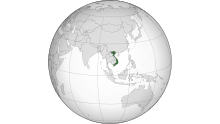Socialist Republic of Vietnam: Difference between revisions
More languages
More actions
420dengist (talk | contribs) No edit summary Tag: Visual edit: Switched |
420dengist (talk | contribs) No edit summary Tag: Visual edit |
||
| Line 4: | Line 4: | ||
| image_coat = Emblem of Vietnam.svg | | image_coat = Emblem of Vietnam.svg | ||
| image_flag = Flag of Vietnam.svg | | image_flag = Flag of Vietnam.svg | ||
| image_map = Vietnam (orthographic projection). | | image_map = Vietnam (orthographic projection).svg | ||
| map_width = 220px | | map_width = 220px | ||
| capital = Hanoi | | capital = Hanoi | ||
Revision as of 15:26, 2 February 2021
Cộng hòa Xã hội chủ nghĩa Việt Nam | |
|---|---|
 | |
| Capital | Hanoi |
| Largest city | Ho Chi Minh City |
| Government | Marxist-Leninist socialist state |
• President and General Secretary | Nguyễn Phú Trọng |
• Vice President | Đặng Thị Ngọc Thịnh |
• Prime Minister | Nguyễn Xuân Phúc |
• Deputy Prime Minister | Trương Hòa Bình |
| History | |
• Reunification and end of US occupation | 2 July 1976 |
| Population | |
• 2019 estimate | 96,208,984 |
Vietnam, officially the Socialist Republic of Vietnam is a socialist state on the Indochinese Peninsula in Southeast Asia. The 2019 census counted a population of 96,208,984[1]. The country borders China to the north and Cambodia and Laos to the west. The capital city is Hanoi while the most populous city is Ho Chi Minh City (also known by it's previous name of Saigon).
Politics
Vietnam is a Marxist-Leninist one party socialist republic. The ruling party is the Communist Party of Vietnam.
Economy
After reunification in 1975 Vietnam became a centrally planned economy. In the late 1980s the economy was suffering from a decline in Soviet aid, the decomposition of the Eastern Bloc and the effects of the post-war embargo by the USA. In 1986 the CPV adopted a series of market reforms known as Đổi Mới which would transition the country to a socialist-oriented market economy.


